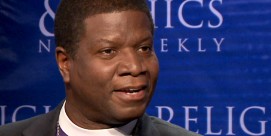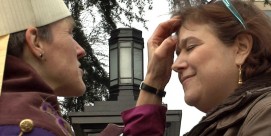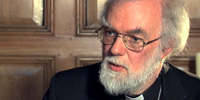In This Episode << SLIDE LEFT TO SEE ADDITIONAL SEGMENTS
Bishop Eugene Sutton
Read more of Kim Lawton’s interview at the Lambeth Conference in Canterbury with Episcopal Bishop Eugene Sutton of Maryland:
Q: Overall, have there been new relationships built here, as the organizers suggest?
A: Oh, yes, this Lambeth Conference is all about the building of relationships. Everybody wants to know are we going to split, is there going to be schism. Anybody who knows the answer to that is fooling you if they say they do, but it’s just a classic situation of only two options. On the one hand, there are those who believe the big issue before us of homosexuality is a sin, and then on the other side there are those who believe as a justice issue that homosexual persons are loved by God and need all the rights and privileges as everyone else, even in the church. How do you reconcile those two? That’s the issue before us.
Q: Can they be reconciled?

Bishop Eugene Sutton |
A: I don’t think the issues can be reconciled, but people can be reconciled. There’s an old proverb that goes this way: If you want to go fast, go alone. If you want to go far, go with others. And that applies whether or not you are the Diocese of New Hampshire or if you are with those bishops who decided not to come. It is much easier and quicker to do things alone. But if we want to go far in making a difference in the world, then we need all of us. We need to take others with us, and that means that things are going to go a bit slower than people on both sides would want. In Jesus’ day, the religious leaders had a conference maybe similar to this, not as large, where one of the Pharisees said do not be too quick to decide on whether or not this man Jesus is of God. If he is of God, the Spirit will reveal that to us over time. And if not, it will also be revealed to us. What we need to do here at Lambeth is take a deep breath together and don’t come too quickly to decisions and resolutions. If what we are doing, and the full inclusion of gay and lesbian people in the life of the church, if that is of God, the Holy Spirit will reveal it to us over time.
Q: Have you been hearing from your fellow bishops from other parts of the world that they are still troubled by what the US has done?
A: Oh, yes. I’ve asked some of the bishops in countries where Christians are a persecuted minority, and I’ve asked them, have the actions of the Episcopal Church in 2003 caused problems for you and your people? One bishop said to me, “Of course, my brother, it’s caused tremendous problems.” They are persecuted every day by a Muslim majority. But he said to me, “I’m not asking you to make my life easier. I just want you to know what it has done here.” He is willing to bear the cross. If standing up for the least in his society, the voiceless who are people of homosexual orientation, if that is the price he must pay, he is willing to bear that cross. But he wants you to know that it’s a cross for him in a way that Americans do not have to bear.
Q: Americans have been the subject of quite a bit of discussion, and some of the proposals are pretty restrictive. Obviously, they are still proposals, but do you sense a movement toward some more punitive measures coming out of Lambeth?
A: There is some movement. Some want to use the language of judgment and of punitive actions and of bans. But there is something about banning people, banning actions of people who believe they are led by the Holy Spirit, there’s something about that that is very difficult for other Christians to do. I don’t believe there will be any bans coming out of this Lambeth Conference. Why? Because we’ve prayed together, we’ve studied the Scriptures together. We’ve argued together forcefully. How then can you ban your brother or your sister because they disagree with you on some fundamental things about ethics and morality? But Jesus, in one of his great parables, when he’s talking about who is to enter the kingdom of heaven, those who are entering the kingdom of heaven are entering not because of anything around sexual ethics or what they believe about women or views about interpretation of Scripture. Jesus said those who enter the kingdom are those who have fed hungry people. They are housing those who have no home. They are visiting people in prison and in hospitals. They are giving a cup of water to those who are thirsty. When we get back to these issues, I think it would be a wonderful thing if, when people think of the Anglican Communion, they think of oh, how they love each other and how they are feeding a hungry world, not oh, those are the ones who are bickering about sex.
Q: This was the first Lambeth meeting for Katharine Jefferts Schori, who is here not only as a bishop but as the presiding bishop of the Episcopal Church. How has she been received, and how do you perceive that issue is being dealt with here?
A: Her presence, of course, is pushing the edge for a number of people. They are in societies and cultures where women do not take leadership. I think it’s a marvelous work of the Holy Spirit. But, of course, I’m African American. I’m the first African-American bishop of Maryland. The first bishop of Maryland owned slaves, as did most of the Episcopal clergy, and they used the Bible to justify it. For hundreds of years, my people have been subjugated, abused, and scapegoated by use of Scripture. For many, many years people have used Scripture to build boundaries and bans around the reach, the scope of God. It’s no accident that the African-American bishops in the American Episcopal Church all have a full-inclusion agenda, because we see this as a justice issue, people using the Bible to build a fence and to limit those who are not like them. What we want to say is, before you make decisions about whether or not women should take leadership in churches, consult with women. Before you make decisions about whether gay and lesbian people are called by God to be in communion with other Christians, talk to people of homosexual orientation and include them. One is for sure in my diocese, whatever decisions we make, it won’t be the decisions made by a relatively small number of men sitting in a room deciding for everybody. All of us will be there. We dare to believe that the Holy Spirit speaks even through the uneducated, even through people who normally are not at the corridors of power. We are going to include the voices of everybody. Maybe one other thing: Some hundreds of years ago, slave owners said to my people God wants you to be a slave, and they were educated, they were erudite, and they had the Bible. My forebears, my mothers, fathers of my race and my church said you’re wrong, and they could not even read. The question we need to ask ourselves is, how did they know, how did they know that despite the Scriptures that people were pointing at for them saying that slavery was justified, how did they know that God didn’t want them to be that, that God wanted them to be free? That is an issue for us today. Before we so quickly exclude others we need to say, could the Holy Spirit be speaking to us through them? And maybe we are only interpreting Scriptures based on our own comfortablity, rather than what God wants.
Q: You spoke earlier about the spiritual discipline of patience. A lot of people come to these conferences and it sounds like arguments we heard five years ago, ten years ago, and I’m picking up some sense of frustration in some quarters that we’ve had these conversations and we’ve had these conversations. How do you respond?
A: Yes, we’ve had these conversations for several years now. But Christians always need to take the long view. It took the church 300 years to come to an acceptable formulation of the divinity of Christ, the Nicene Creed. What did Christians do for 300 years? They talked with each other, they gathered. Some believed this, some believed that. It took the world hundreds of years to come to a conclusion that slavery everywhere was wrong. It’s a relatively recent phenomenon. It’s taken the church hundreds, millennia of years to discover that God is calling women to leadership in the church. So just because we’ve talked about issues of human sexuality for the last 20, 30 years, that doesn’t mean much in the life of the church. Our children and children’s children will judge us by what we’ve done today, and I want to be on the right side of history here, and history is a long time. So people may be tired of talking, but when we’re tired of talking about these issues, we are no longer being faithful. We’re just doing what we want to do, and we’re believing, “I’ll just hang out with those who agree with me.” That may be easy, and it may cause you to move off of these issues very quickly. But it’s not being faithful. We need all of us.
Q: Anything else you want to add?
A: Maybe this: The Archbishop of Canterbury said in his last presidential address that the two sides of this issue need to come to the center, which is Christ. But, of course, if the center is a political compromise, that hardly looks like the Gospel. If Jesus is the center, Jesus is also the one who is before us and in front of us, and Jesus is also at the margins. If we are going to follow the center who is Jesus, that means along the way we may have to make some uncomfortable changes in the status quo. So I believe that the Holy Spirit is calling us in this conference to take some bold steps toward inclusion of all people, even though it causes pain among some, because a lot of us believe that’s where Jesus is.






